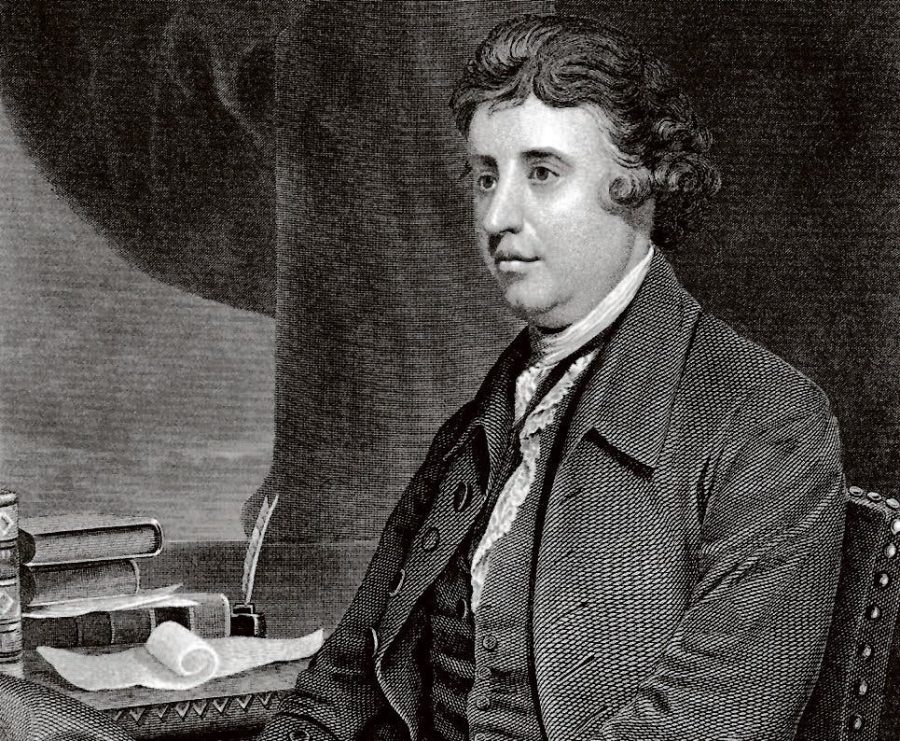The Revolutionary Versus the Conservative
One of the first articulations of conservative philosophy, Edmund Burke’s Reflections on the Revolution in France, was written in resistance to the revolutionary fervor that overtook France in the late 18th-century. Throughout his essay, Burke details his reservations about the French revolutionaries, who sought to replace the aristocratic Ancien Régime with a new political order founded on a democratic “social contract.” Above all, Burke worried about the abstractness of the revolutionaries’ philosophy, questioning the legal and social methods by which their philosophical ideals could become concrete. The fact that the French revolutionaries were so sanguine as to think they could actualize their philosophical abstractions with ease and flawlessness worried Burke. He understood that man’s “private stock of reason is small,” much too puny to accommodate the intricacies of political societies. This form of incurious self-optimism identified by Burke is a feature of what might be called the revolutionary mindset. While it has taken many forms since the French Revolution, the revolutionary mindset always contains two immovable and distinguishing hallmarks. The first of these is an absence of curiosity for how the philosophical ends of revolution might be realized. One sees this clearly in Marx and Engel’s fanciful description of “full communism” in The German Ideology, where they paint a picture of a world in which one can “hunt in the morning, fish in the afternoon, [and] rear cattle in the evening.” To question who supplies the gun to hunt, the rod to fish, and whose cattle are to be reared is to be an enemy of the revolution—such matters are simply beside the point. For the revolutionary, eliminating the obstacles preventing revolutionary upheaval is given priority to properly implementing the revolutionary goals. This inversion occurs because the revolutionary view entails a critical attitude toward existing society: it seeks not to construct or build but primarily to destroy and repudiate. Because they are motivated by negativity, revolutionary governments naturally set about destroying things and targeting those deemed threatening to the revolution.
The second main feature of the revolutionary mindset justifies their destructive impulse. Central to the revolutionary worldview is a criterion of legitimacy which no actual institution can pass. This criterion can take the form of “equality,” “liberation,” “social justice,” or any other goal vague enough to justify the destruction of everything that purportedly stands in its way. The legitimacy of a revolutionary government derives from the pursuit of its stated objectives. But since these goals, and the revolutionary spirit associated with them, always tend to recede with time, the revolutionary state must always fixate on new enemies against whom the powers of the state can be actively weaponized. A facade of emergency is to be upheld through show trials, executions, and the mass administration of propaganda, all of which could be observed in revolutionary orders like the Soviet Union. Revolutionary governments unite the people around a common enemy, creating the social fragmentation on which totalitarianism depends.
The opposite mindset from the revolutionary is that of the conservative. Where revolutionaries see a right to rebel, conservatives see an obligation to obey. While revolutionaries seek to reshape society along ideological lines, conservatives emphasize that which is given and how settled forms of life can promote human flourishing for ordinary people. Those on the revolutionary left often reproach conservatives for being complacent and defending the status quo unconditionally, whatever its flaws. They argue that conservatives are inflexibly anti-change. But to argue this is to misunderstand the conservative worldview. In his polemic against the French Revolution, Edmund Burke argued expressly that a “state without the means of some change is without the means of its conservation.” Burke was skeptical of change inasmuch as it sought to remake society anew, preferring change in the direction of continuity and stability—in other words, we must change what we have to so that we can conserve what we can. Revolutionary change is dangerous, however, because it involves massive and abrupt alterations that potentially jeopardize our inheritance and overestimate the power and capacity of human reason. Burke is famous for reimagining the Enlightenment social contract as taking place not only between those who are presently living but between those who have died and those who have yet to be born. Burke extrapolated from this the conclusion that political obligation spans across generations. No single generation has a right to experiment with revolution, to haphazardly take for granted their inheritance, at the expense of future generations, and with irreverence for the generations who have gone before. The relationship between citizens and their state “ought not to be considered as nothing better than a partnership agreement in a trade of pepper and coffee, callico or tobacco, or some other such low concern, to be taken up for a little temporary interest, and to be dissolved by the fancy of the parties…” but with increased reverence, because it is “… a partnership not only between those who are living, but between those who are living, those who are dead, and those who are to be born. Each contract of each particular state is but a clause in the great primaeval contract of eternal society.”
To touch upon the second point, even if we were licensed to rebel against the prevailing order, what are the chances of successfully implementing a new social order tabula rasa without troubles or other unintended consequences? Conservatives emphasize the imperfection of man and understand that all efforts throughout history to remake society from scratch through top-down control—from the French Revolution to the Soviet experiment to 1930s Germany—have always created situations worse than the initial ones that needed to be remedied. The fundamental conservative idea is that societies are able to reproduce themselves precisely because of the inherited social knowledge that accumulates over generations, which helps humans coordinate their shared social existence. The rational and the reasonable can at times diverge (e.g., one can apply their reason to pursue an end that is unconformable to the dictates reason); purged of inherited traditional knowledge, human reason is dangerous and unpredictable, cut loose from the sources that direct and guide it toward reasonable solutions. The inadequacy of pure reason is why the excesses of rationalist philosophy throughout history, upon inspection, seem entirely unreasonable. Rationalists perhaps neglect the fact that the content of reason—what is reasoned about—does not itself derive from reason but outside sources, including experience, as well as the generational experience and wisdom embodied in social traditions. 20th-century English conservative Michael Oakeshott, in his indispensable essay Rationalism in Politics, demonstrates the inadequacy and incompleteness of pure reason by means of a clever analogy: “As with every other sort of knowledge, learning a technique does not consist in getting rid of pure ignorance, but in reforming knowledge which is already there. Nothing, not even the most nearly self-contained technique (the rules of a game), can in fact be imparted to an empty mind; and what is imparted is nourished by what is already there. A man who knows the rules of one game will, on this account, rapidly learn the rules of another game; and a man altogether unfamiliar with ‘rules’ of any kind (if such can be imagined) would be a most unpromising pupil. And just as the self-made man is never literally self-made, but depends upon a certain kind of society and upon a large unrecognized inheritance, so technical knowledge is never, in fact, self-complete, and can be made to appear so only if we forget the hypotheses with which it begins. And if its self-completeness is illusory, the certainty which was attributed to it on account of its self-completeness is also an illusion.” Conservatism, properly understood, relies on two formative premises: good things are more easily destroyed than created, and the fact of man’s imperfection. Against the background of these two premises, there is only minimal room for radical societal changes. On the conservative view, revolutionary change is both politically impermissible and unlikely to lead to any societal improvements.








![[From left to right-Top row: Harison Fliegenspan, Talia Russo, Isis Leite, Micaela Thone, Rosella Paniccia. Bottom row: Maya Rolan, Eren Yoshimura, Audrey Cheung, Karinah Diaz]](https://thehuskyherald.org/wp-content/uploads/2025/02/IMG_0927.jpg)
















